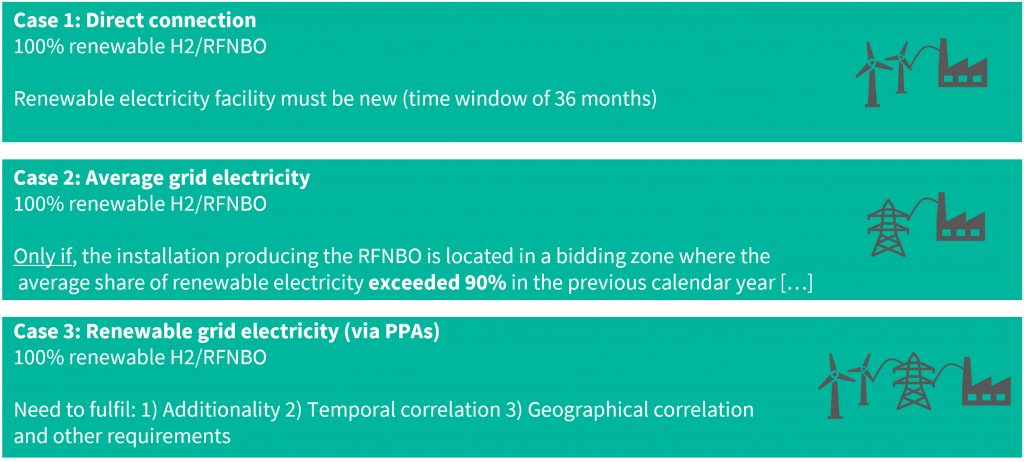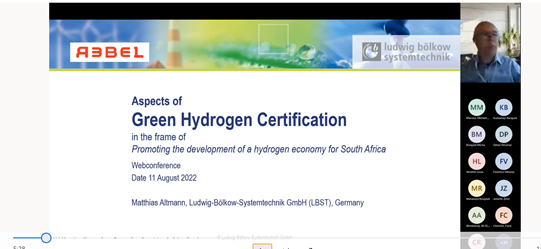South Africa is one of the key countries positioning itself to leverage the potential presented by the global emerging green hydrogen economy. Minister Patel addressing the 2nd Renewable Hydrogen and Green Powerfuels webinar in April 2021 stated that
“We stand on the brink of a new development in our efforts to bring cheaper, more accessible energy solutions to the world, in the form of hydrogen. If the 20th Century becomes known as the century of crude oil (and nuclear energy); the 21st Century may become known as the century of renewables and hydrogen.”
– Ebrahim Patel, Minister of Trade and Industry of South Africa
For the country to be able to explore the potential export opportunities that the hydrogen economy presents, it is important to bring forward the necessary policies, regulations, standards, and certificates to meet the requirements of its trading partners.
Against this background, a webinar in August discussed the certification requirements for green hydrogen and PtX products. Matthias Altmann, Leo Diel and Dr Uwe Albrecht from Ludwig-Bölkow-Systemtechnick GmBH presented on what is required, particularly in Europe, for green hydrogen to be certified as “green” (renewable) under proposed requirements. The webinar further covered topics such as the key elements of sustainability of green hydrogen and PtX products and an international overview of hydrogen standards and systems. A focus was on the EU’s amendment to the Renewable Energy Directive (RED II) in the form of two Delegated Acts. The Delegated Act to Art.27(3), which defines details of electricity supply cases, is of interest to the audience given that South Africa, at this stage, has a fossil and renewable energy being fed into the grid. The electricity supply cases described in the Delegated Acts are the following: 1) grid mix, 2) direct connection to 100% renewable hydrogen and 3) PPA (Power Purchase Agreement) 100% renewable hydrogen with a required greenhouse gas emission saving of 70% compared to a given comparator of 94gCO2eq/MJ. The three cases of electricity sourcing for the production of renewable hydrogen and Renewable Fuels of Non-Biological Origin (RFNBOs) are illustrated below.

In addition to the sourcing options, the Delegated Act describes further requirements that need to be met. They can be summarised as additionality, temporal correlation and geographical correlation. For a more in-depth look at the Delegated Acts, read our summary: Delegated Acts on Art. 27 and 28 explained: How they will shape the PtX market ramp up – PtX Hub (ptx-hub.org).
Much is still to be considered. Following up on the webinar, a workshop on the Green Hydrogen Regulatory Framework and Strategic Planning in September focused on developing recommendations for the development of a green hydrogen economy. The recommendations focus on policy and regulatory requirements needed across different sectors to provide an enabling environment for the green hydrogen and PtX emerging market. The final report will be available in November 2022.
About the project H2.SA
There is a growing need for defossilisation across different sectors in South Africa; to this end green hydrogen and PtX products have been identified to play a major role in the South African energy transition. The development of a green hydrogen (H2) economy features prominently in government policy documents such as the Hydrogen Society Roadmap. The Deutsche Gesellschaft für Internationale Zusammenarbeit (GIZ) GmbH was commissioned by the German Federal Ministry for Economic Cooperation and Development (BMZ) to develop a concept for a green H2 project in South Africa (H2.SA).
The objective of H2.SA is thus to support the South African public and private sector to utilise the potential of a sustainable green H2 economy. To this end, the H2.SA project collaborates with various stakeholders such as the Investment and Infrastructure Office (IIO) within the Presidency as the political partner, the Department of Mineral Resources and Energy (DMRE), the Department of Trade Industry and Competition (dtic), the Department of Science and Innovation (DSI), as well as the Department of Forestry, Fisheries and the Environment (DFFE). The project consists of four focal workstreams which are Strategy Development and Enabling Framework, Business Development, Research Innovation & Training and Sustainability & Just Energy Transition.
More about H2.SA: Promoting green hydrogen (giz.de)
Thabo Chauke and Morongoa Ramaboa contributed to this article.
